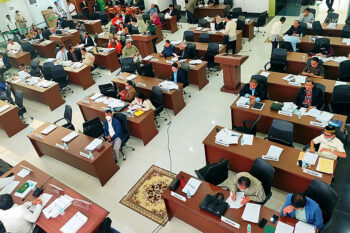MALAYBALAY CITY (MindaNews/27 March) – Who would have thought years ago that today, right in the grounds of Malacañang where the fate of Mindanao has had been shaped since colonial times, the Philippine government will finally enter into a comprehensive agreement with the Moro Islamic Liberation Front (MILF)?
True, this is not the first time that the state has entered into peace pact with a Moro revolutionary organization. In 1996, the Ramos administration signed a Final Peace Agreement with the Moro National Liberation Front (MNLF), although the latter has expressed misgivings on its implementation.
True, the MILF sprang from the MNLF in the late 1970s, after MNLF founding chair Nur Misuari signed the 1976 Tripoli Agreement which was brokered by Libya, then the leading supporter of the Moro struggle for self-determination. The MILF made known its goal of secession and establishing an Islamic state, although the group softened its demand and settled for a sub-state status as the talks with government progressed.
Nonetheless, the split certainly added to the complexities of the Moro question and to how the state should deal with the contending groups in its effort to arrive at a political solution. Central to this is the issue of how to treat the 1996 peace pact vis-à-vis the 2014 Comprehensive Agreement on the Bangsamoro (CAB).
But Nur Misuari’s followers themselves may have unwittingly provided the answer when they staged the tragic standoff in Zamboanga City in September last year. Whatever moral right they may have in exacting full compliance of government to the 1996 agreement has been eroded by that misadventure.
Which may explain why, in the run-up to today’s signing of the CAB, nobody bothered to talk anymore about the earlier agreement. Except perhaps for Misuari’s MNLF the general sentiment seems to be to move on and focus on cementing the gains of the GPH-MILF peace process. In the immediate term, this means passing a Bangsamoro Basic Law (BBL) that remains faithful to the substance of the CAB, and setting up a political structure that ensures broader participation of the common Moro people.
Possible stumbling blocks, however, remain a threat to lasting peace in Mindanao. The relative silence of the so-called spoilers – those who would want to ambush the peace process at every twist and turn – should not be taken as a sign of concession much less surrender. And they are everywhere – lawmakers, other government officials, and others who think they have much to lose with the success of the peace process. Like hungry lions they are just waiting for the right moment to jump on their prey.
Signs of potential trouble ahead have surfaced early on. For instance, Zamboanga City Rep. Celso Lobregat immediately appeared on ANC’s Headstart program to pose some legal questions on the Framework Agreement on the Bangsamoro. His action hinted the likelihood of a petition at the Supreme Court questioning the constitutionality of the agreement any time after the signing.
To make matters worse, they have at their disposal columnists who present half-truths, disinformation and misinformation on the substance of the CAB. One of them loves to use general arguments without the slightest effort to elaborate or present proof, a smart way to convince gullible readers who are as lazy to do their own research. These columnists can be forgiven for their ignorance but not for their apparent malice.
The other option for the spoilers is to derail the enactment of the BBL. In the Senate, President Benigno S. Aquino III may have less difficulty convincing its members to pass the law. The House, however, may not be as eager to leave a lasting legacy of peace for Mindanao. We can only hope for them to have a collective change of heart and submit to the snowballing clamor for peace in the island without expecting a quid pork quo (I mean quid pro quo) from Malacañang.
Moreover, there are latent rumblings on the ground. Two days ago, MindaNews reporter Keith Bacongco sent photos of an assembly of Ilaga members in an undisclosed place in North Cotabato. The Ilaga, a paramilitary group sanctioned by the Marcos government to fight Moro rebels, continues to bear arms and it would only take a little provocation or pretext to ignite its members into action against their Muslim neighbors.
And, lest we forget, the Bangsamoro Islamic Freedom Fighters still lurks in the shadows, although I personally believe it is now more of a police matter rather than a political one.
Peace is at hand with the signing of the CAB. But some reality check is necessary to ensure its full blooming. (MindaViews is the opinion section of MindaNews. H. Marcos C. Mordeno can be reached at hmcmordeno@gmail.com.)







